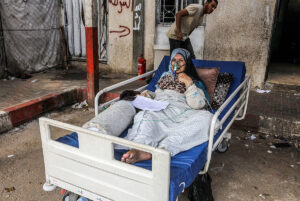The deadly cost of Israel’s restrictions on foreign doctors in Gaza

A patient at the European Hospital near Khan Younis after the Israeli army ordered an evacuation of the facility in southern Gaza, 2, July 2024
Patricia Martinez Sastre reports in +972 on 30 January 2025:
In an attempt to save the lives of Palestinian children hospitalized in Gaza, Dr. Ayaz Pathan did something he never thought he would: allow others — aged 8 to 14, the same as his own children — to die. “We didn’t have an [available] bed for them,” he recounted of his time at Nasser Hospital in Khan Younis, the largest in southern Gaza. “They were on the floor, and we pulled them to the side while they were still breathing [and] their heart was still beating, knowing that their injuries were unlikely to be survivable. Would they have survived in Jerusalem? Absolutely. In the U.S.? Definitely.”
Pathan, an emergency room physician from North Carolina, volunteered in Gaza from late July to mid-August 2024 as part of what are known as Emergency Medical Teams (EMTs) — groups of foreign medical professionals including surgeons, emergency physicians, nurses, and anaesthetists, that deploy amid humanitarian crises to provide care when the local health care system is overwhelmed. In Gaza, where the health care system is near collapse after the Israeli military has systematically targeted health care facilities and professionals, these foreign medical missions have become particularly vital.
Pathan’s experience is far from unique. In testimonies obtained by +972, six specialist doctors who worked in Gaza and eight officials at the UN and NGOs that negotiate with Coordinator of Government Activities in the Territories (COGAT) — the Israeli military body that oversees humanitarian aid policies in the occupied Palestinian territories — described an emergency response system wholly unprepared to handle the catastrophic conditions on the ground.
For months prior to the ceasefire, Israel imposed severe restrictions on the entry of foreign doctors and humanitarian and commercial cargo into Gaza, while attacking Palestinian police forces guarding aid convoys, which allowed armed groups to loot the supplies. In the four weeks leading up to Jan. 11, fewer than 2,000 trucks entered the enclave, or around 70 daily; an analysis by Oxfam determined that 221 trucks of food alone were needed every day to guarantee the minimum calorie intake for everyone in the Strip. Of those that entered, only 13 carried medical supplies.
